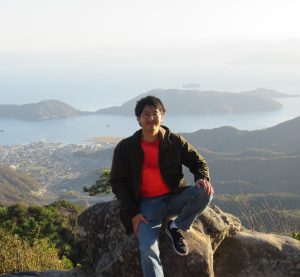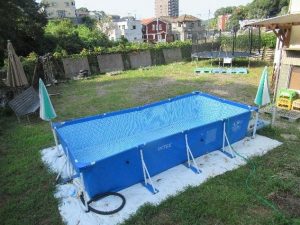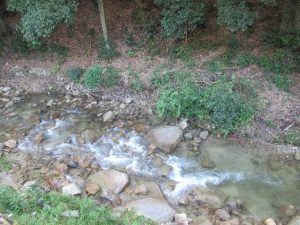100 Stories
Hachi-hachi House: A Homestay That’s Almost Free
When traveling, tourists have an abundance of options to choose from when it comes to accommodation. They may choose their lodging based on price, location, type of facility, or even brand name. Japan has a wide variety of facilities that cater to overnight guests, such as resort hotels, business hotels, love hotels, capsule hotels, youth hostels, guesthouses, ryokans, homestays, and even temple stays. I’ve stayed at my fair share of places around the nation, and each type of accommodation certainly has its own appeal. Some places–like homestays and temple stays–offer special, hands-on experiences that let tourists delve deeper into the local culture through activities like cooking workshops and morning meditation, which can enrich one’s vacation in Japan and be more memorable than overnighting in a chain establishment. Prices for lodging may vary wildly on a plethora of factors, but with the right place under certain conditions, that price can be as low as ¥0!
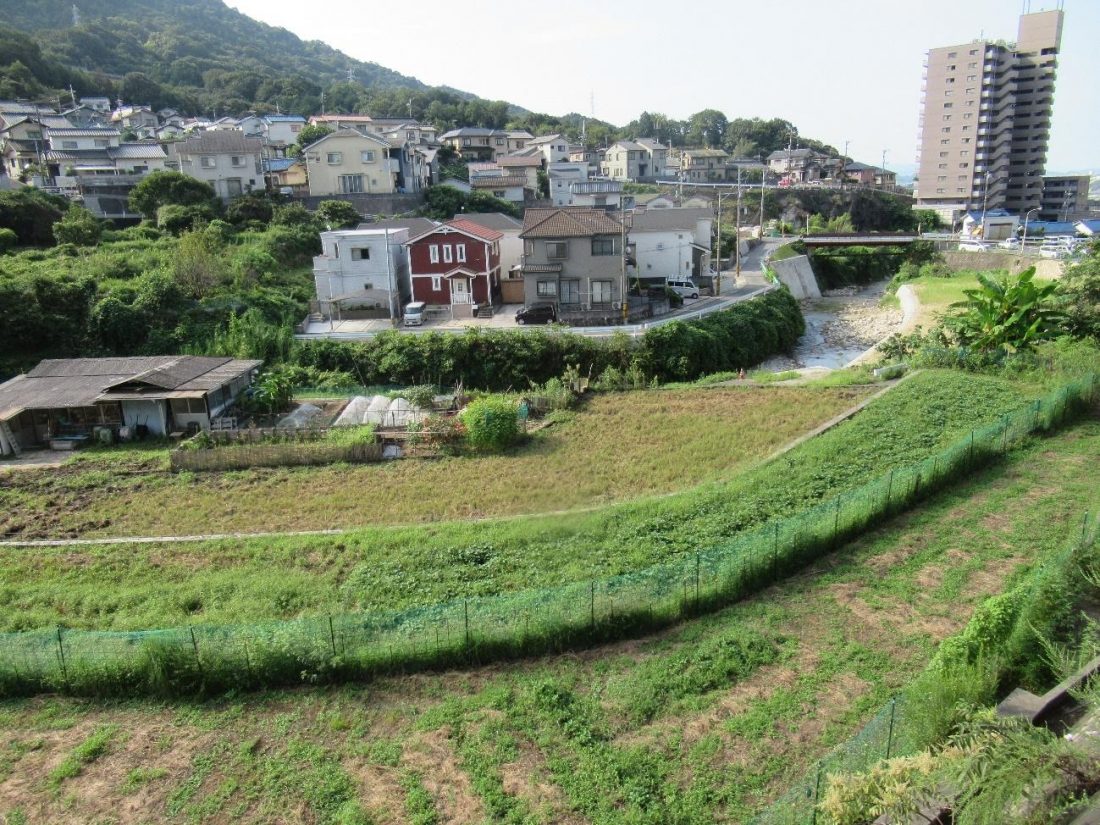
You may be aware of the relatively recent trend in rural areas known as agritourism, whereby guests visit a farm to learn about a day in the life of a farmhand, try the local produce, and sometimes, even engage in a couple laborious tasks that they wouldn’t be able to do in their nine-to-five jobs. One night while I was eating out with a friend, we were watching a TV program featuring a woman who was visiting some Southeast Asian country as a tourist and partaking in some forms of manual labor. My friend was apparently perplexed by such a situation and piped up.
“See, that’s when you know you have too much money.”
“What do you mean?” I replied.
“She’s paying money to do work. Shouldn’t it be the other way around?”
“I guess, but she’s doing stuff she’d never be able to do back home, so the experience could justify the cost.”
“Nah, I’m good. When I’m on vacation, just let me buy the product. I don’t want to have to work for it.”
My friend did have a point, though. Should tourists always have to fork over the money just because they’re visiting? Sure, they’re benefitting the local economy when they pay to engage in these tasks, but at the same time, they should get something back for their efforts. Of course, without a working visa, tourists cannot legally work for a wage in a foreign country, so a different kind of reward is necessary. Enter 88 House (the 88 is pronounced, “hachi-hachi,” which is Japanese for “eight-eight”), a guesthouse in the eastern suburbs of Hiroshima that allows guests to earn their lodging by helping out around the farm.
88 House Overview
88 House may be located far from the urban sprawl of the city, but it’s still fairly accessible by bus from Hiroshima Station. From the Shinkansen exit on the first floor, head north past the Sheraton Grand Hotel and cross the street to the bus stop. You’ll be taking the number 29 bus and getting off at 上温品小学校入口 (かみぬくしなしょうがっこういりぐち – Upper Nukushina Elementary School Entrance ). After walking a few paces north and crossing to the other side of the street, you’ll come across this sign directing visitors to the guesthouse.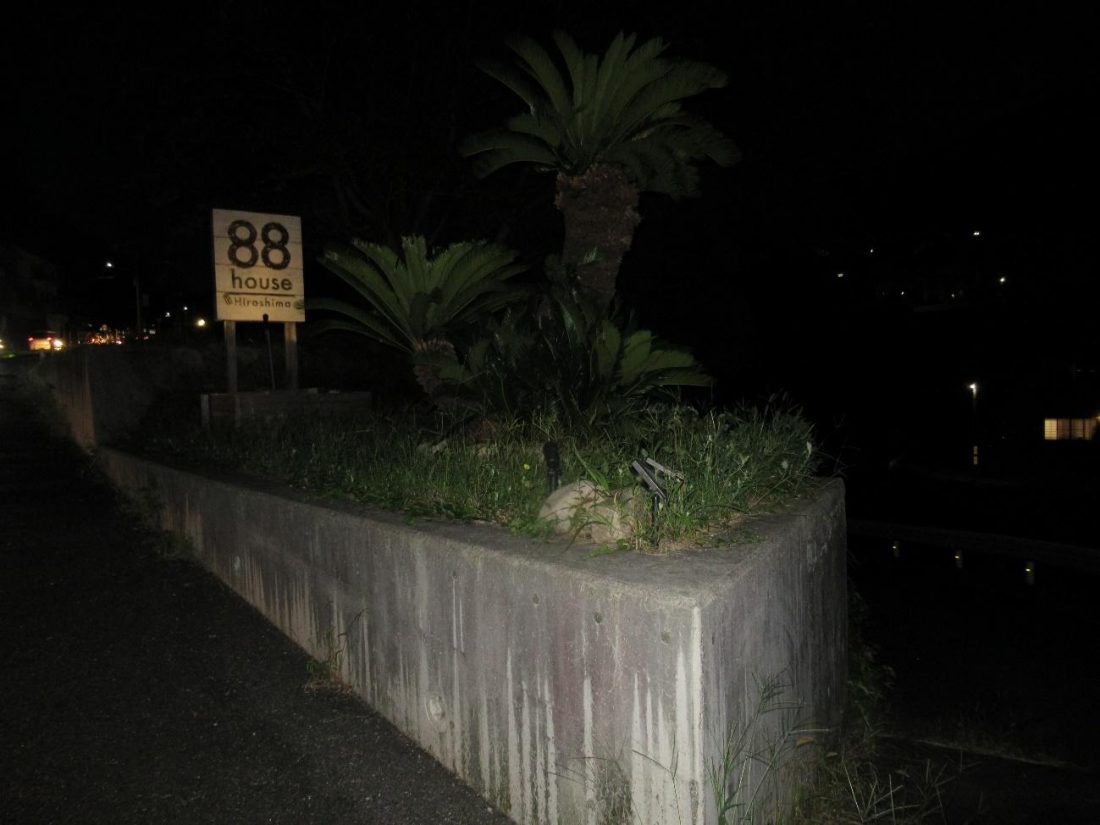
You can either turn right at this point or use another entrance further ahead, which is closer to the house. If you go in via this first entrance though, you’d do well to have a flashlight on you. It was dark when I arrived for check-in, and when I took the first path, it was hard to see what was directly in front of me. There’s a stream flowing right past 88 House and there may be lots of wildlife in the fields, so be careful when meandering over to the building. I eventually reached the front door of the house, which was unmanned, and since nobody responded when I knocked, I entered and vocally made my presence known.
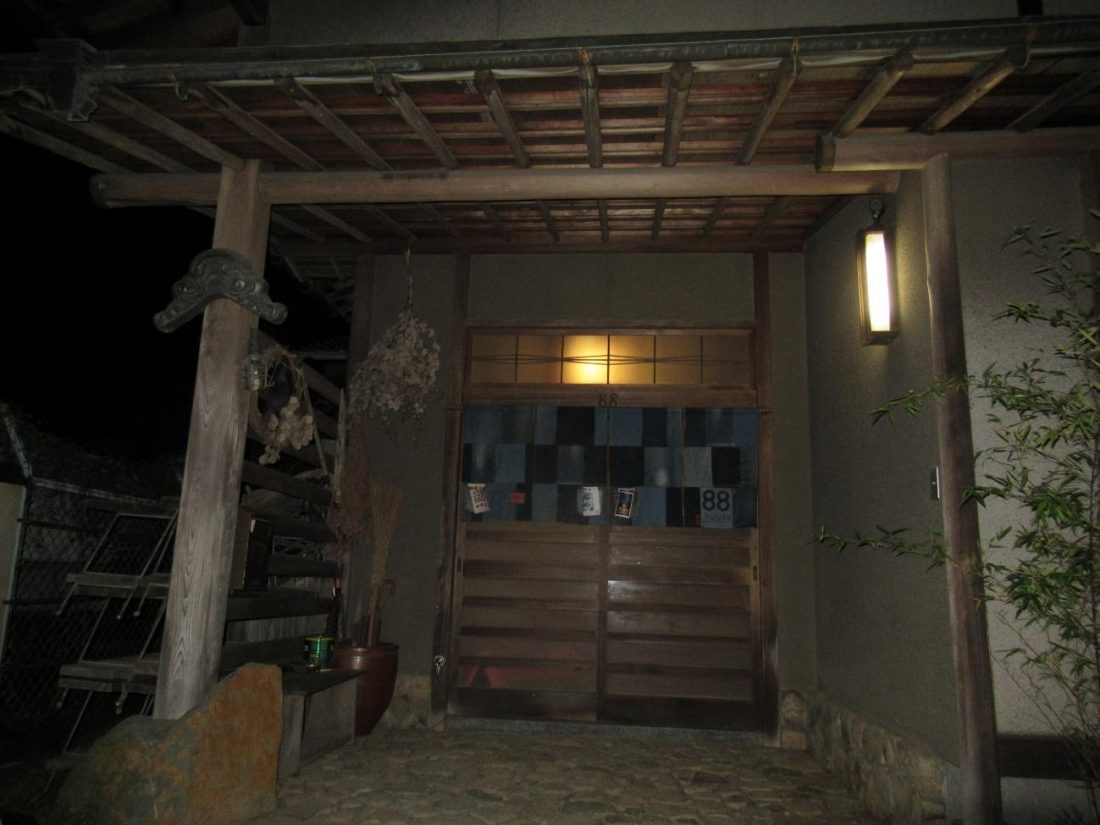
88 House is run by a man by the name of Kengo Momota, who delightfully engages in dialogue with his international guests while introducing them to the farming scene in Japan as well as teaching them more about places to see in Hiroshima. Mr. Momota is in need of a helping hand around his farm regardless of season, so anyone who agrees to assist him the next morning can spend the night for free. If you’d rather not put in the time or effort to do some light manual labor, the rate for one room is still rather reasonable; it can compete with the prices of other hostels in the area, with better quality rooms to boot. However, since the farm labor asked of guests is on the light side, and because there’s ample time to shower, sleep, and eat before starting, I believe that exchanging a couple hours of work for accommodation is the better deal. 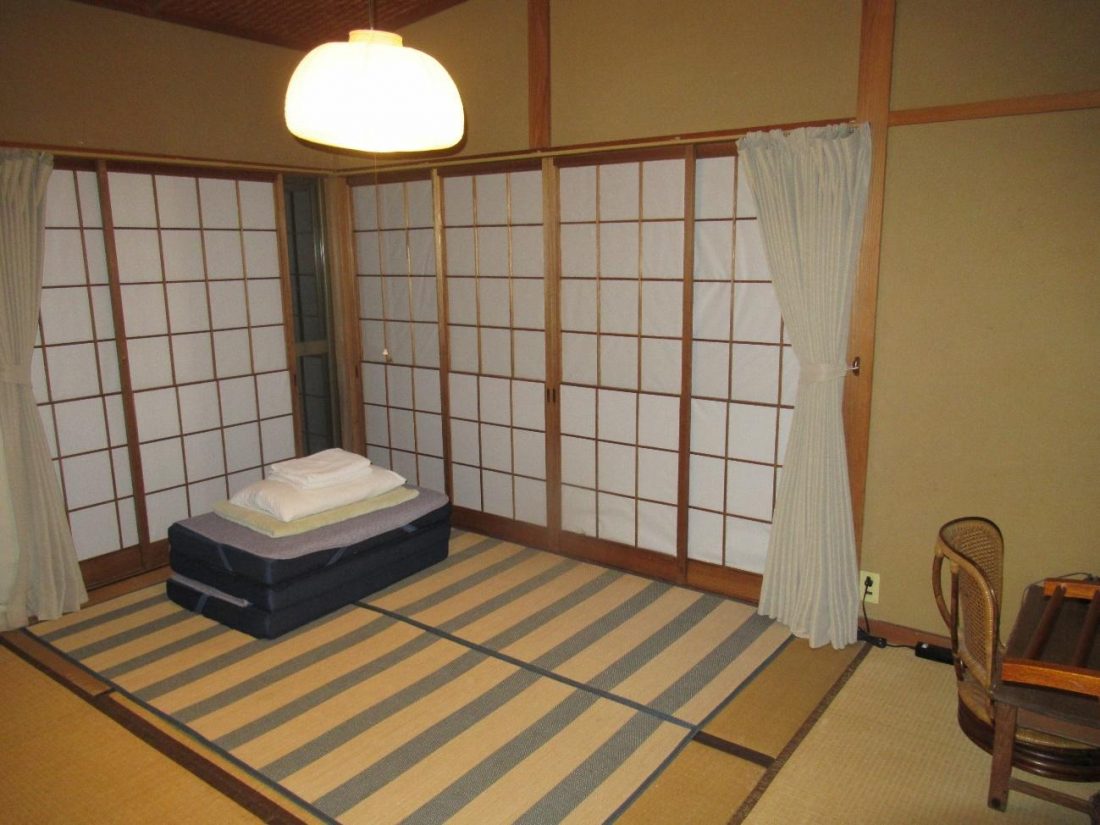
Mr. Momota had been expecting me as I called in advance to notify him that I would be arriving later than planned, so without any delay, he invited me into the house and showed me to my quarters. 88 House has several guest rooms, each of which can accommodate an entire family, but tonight I had the whole house to myself, and would sleep in the bedroom right across from the kitchen. Mr. Momota provides room but doesn’t provide board, so guests are asked to bring their own meals in advance to heat up and consume in the kitchen. Not long after being given a tour of the facilities, I returned to my room, took out the food I bought at ekie Kitchen in Hiroshima Station, and sat down at the dinner table to have a chat with Mr. Momota, who was whipping up a snack of his own. 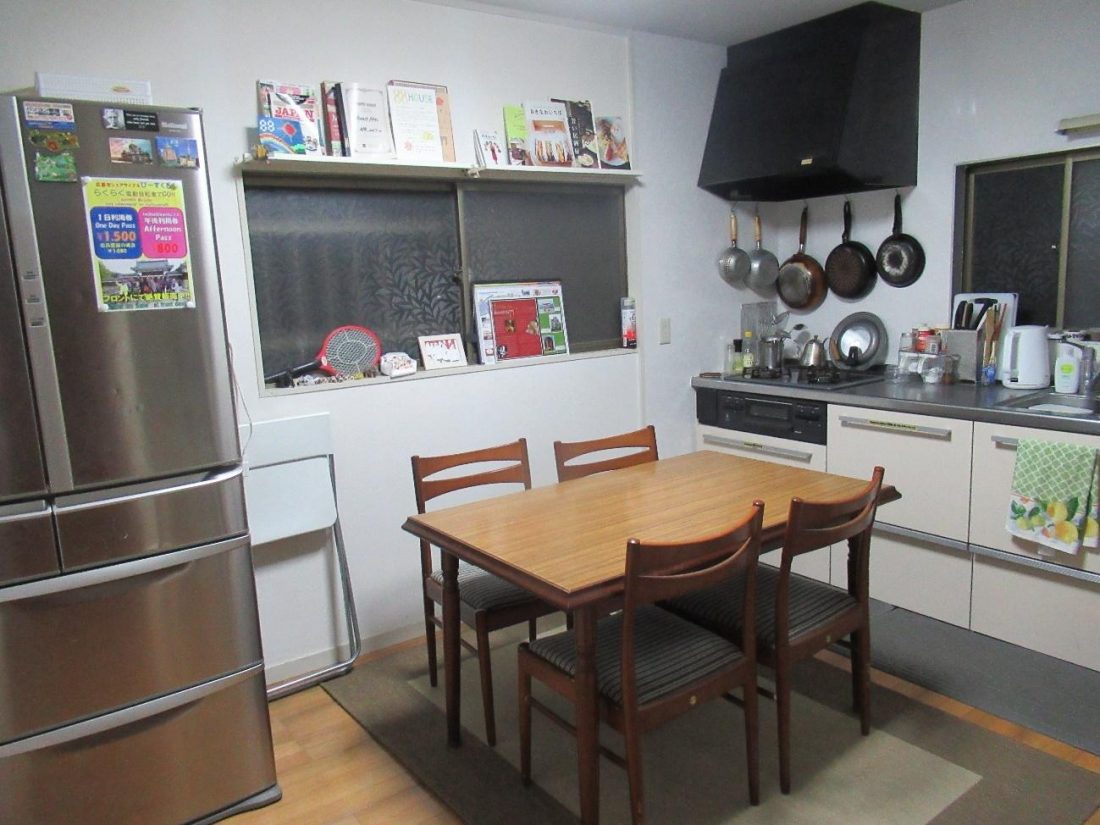
He gave me plates and cutlery so I could eat my ready-made meal in a more presentable fashion, and he also treats his guests to a beer or soft drink while everyone eats and talks together. As I chowed down, he asked me a lot about myself, and seemed genuinely intrigued by my stories of living in Hiroshima and traveling Japan and the globe. It was a pleasure to have such amusing banter with the man running this place, and it wasn’t until I was on the verge of finishing my food that we shifted the conversation to tomorrow’s task. Since Mr. Momota didn’t plant any rice this year, I wouldn’t be able to see the rice paddies in their full glory. However, he assured me that there’s always something that needs doing, even if it’s just pulling weeds over a wide area of land.
Moment of Joy: Welcome Home!
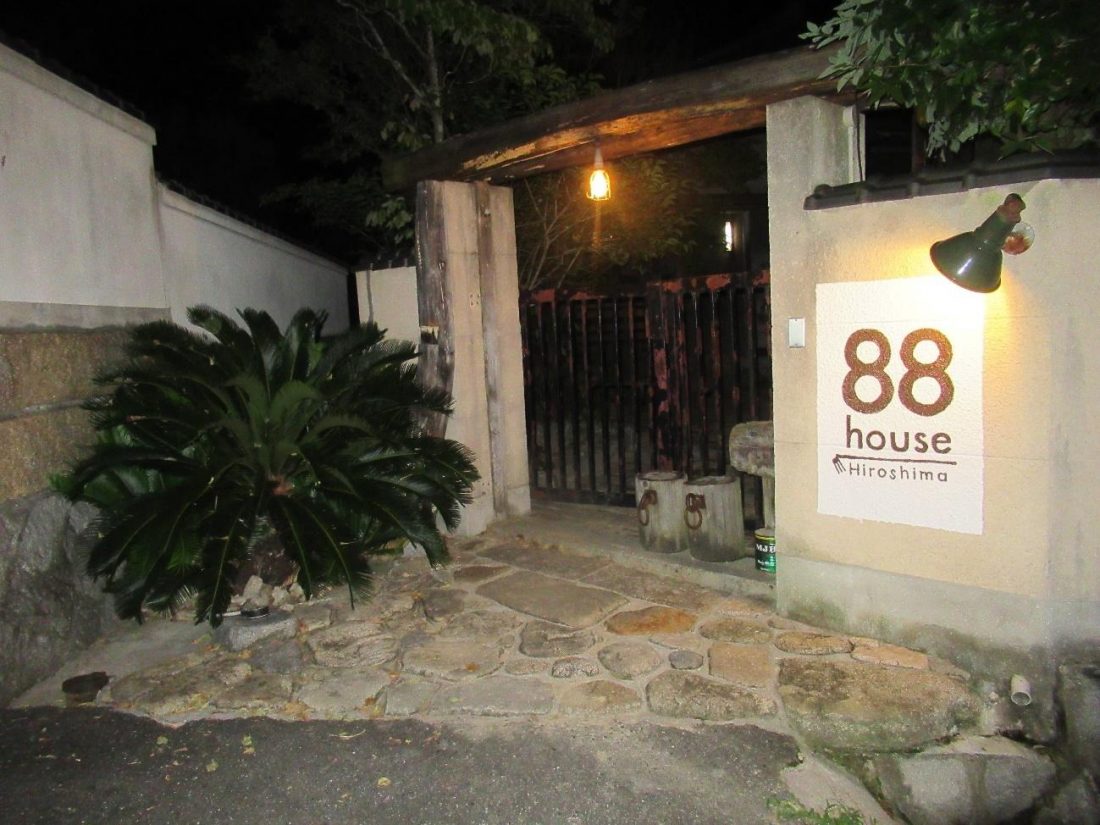
The atmosphere of 88 House made me feel less like I was on vacation and more like I was visiting a friend’s house. Even though my dinner wasn’t homemade, being able to eat it in somebody’s kitchen while having casual conversation with the host made the food taste better. After dinner, Mr. Momota left me to my devices, but the homey feeling lingered long after, whether I was lounging about in my room or exploring the rest of the house. I have no family in Japan and had only met Mr. Momota for the first time tonight, but from that meal onward, I sincerely felt like I was at home here.
Spending the Night
The house is pretty uneventful once guests finish eating; take that however you will. There was no Wi-Fi when I stayed at 88 House, so you may wish to bring a book, a game console, or something to occupy time that doesn’t require an Internet connection. I sat at the desk and worked on organizing my thoughts and pictures from my adventures across Hiroshima Prefecture, and once I felt like winding down, I took a change of clothes to the bathroom for a shower. Despite being a regular house, the few features of this lodging reminiscent of traditional Japan–like this hot spring curtain in front of the bathroom entrance–were a welcome reminder that I was still regarded as an esteemed guest in this unconventional guesthouse. After my shower, I went back to my bedroom to assemble my futon, brushed my teeth, and then fell asleep to the tranquil flow of the stream right by the house.
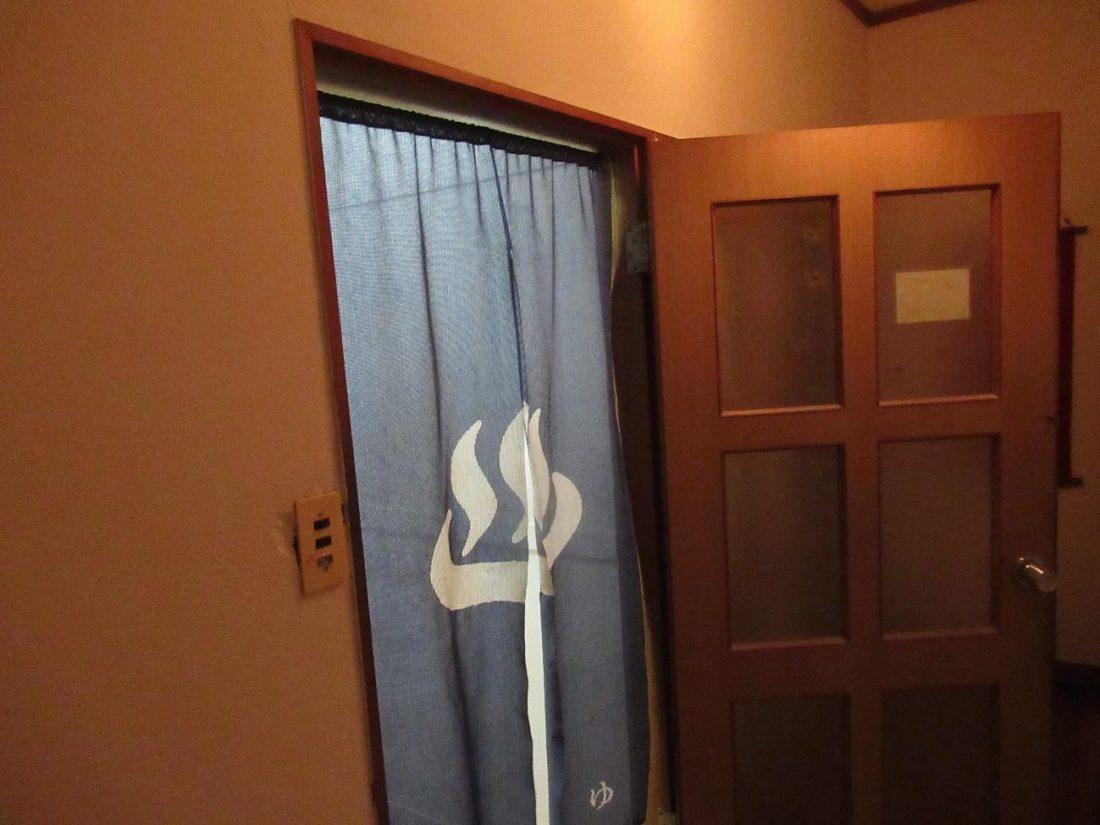
My room was pitch black after turning out the lights at night, but come sunrise, it actually got fairly bright. After getting up, I immediately went to brush my teeth, and brought my breakfast into to kitchen to eat in solitude. Naturally, after finishing, I brought the dishes to the sink and washed everything I used, just like I would at home. Mr. Momota wouldn’t come to check on me for a while (he lives in the house next door), so I walked around this house to check out corners that were too dark to see the night before.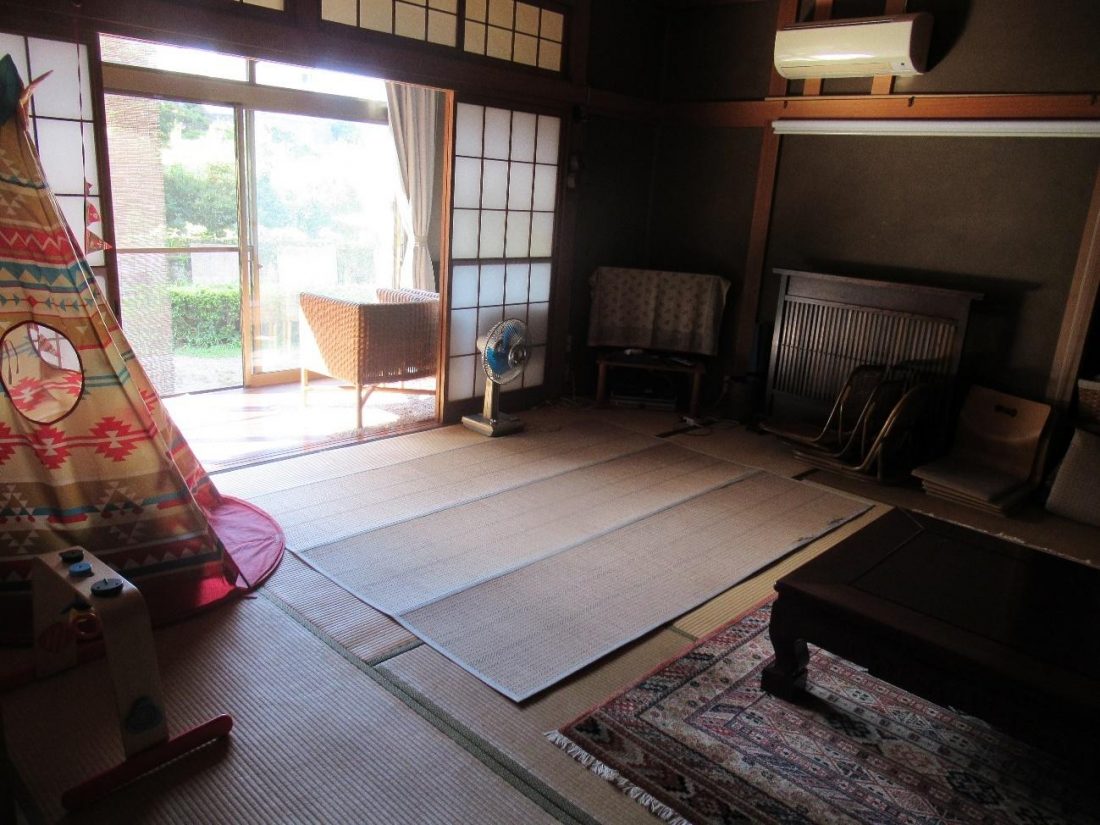
It turns out the one unexplored part of 88 House was a general lounge area, with tons of toys to entertain the little ones. There are windows that offer a wonderful view of the yard outside, but I figured it better to put on my shoes and explore the yard myself. Next to the guesthouse are a couple other buildings that primarily act as storage for the Momota family, but the highlights are definitely the kiddy pool and trampoline, which junior guests would definitely be excited about. I then walked to the edge and could finally glance upon the stream that I heard all night, the grass beneath me also teeming with wildlife. It was getting rather hot even at this early hour, so decided to go back indoors and await Mr. Momota.
Work Begins
I didn’t have to wait long before Mr. Momota came into the kitchen and summoned me outside. He lent me a pair of work gloves and boots to make things easier, and after I had those on, I was ready to roll. The first thing on today’s agenda was to relocate a young lemon tree, so we got some shovels and proceeded to dig a hole where Mr. Momota wanted to plant it. I’m a city boy, so I’m not at all used to using farming and gardening implements, easy as the tasks may seem. Mr. Momota realized this and gave me a hand by digging much faster than I could.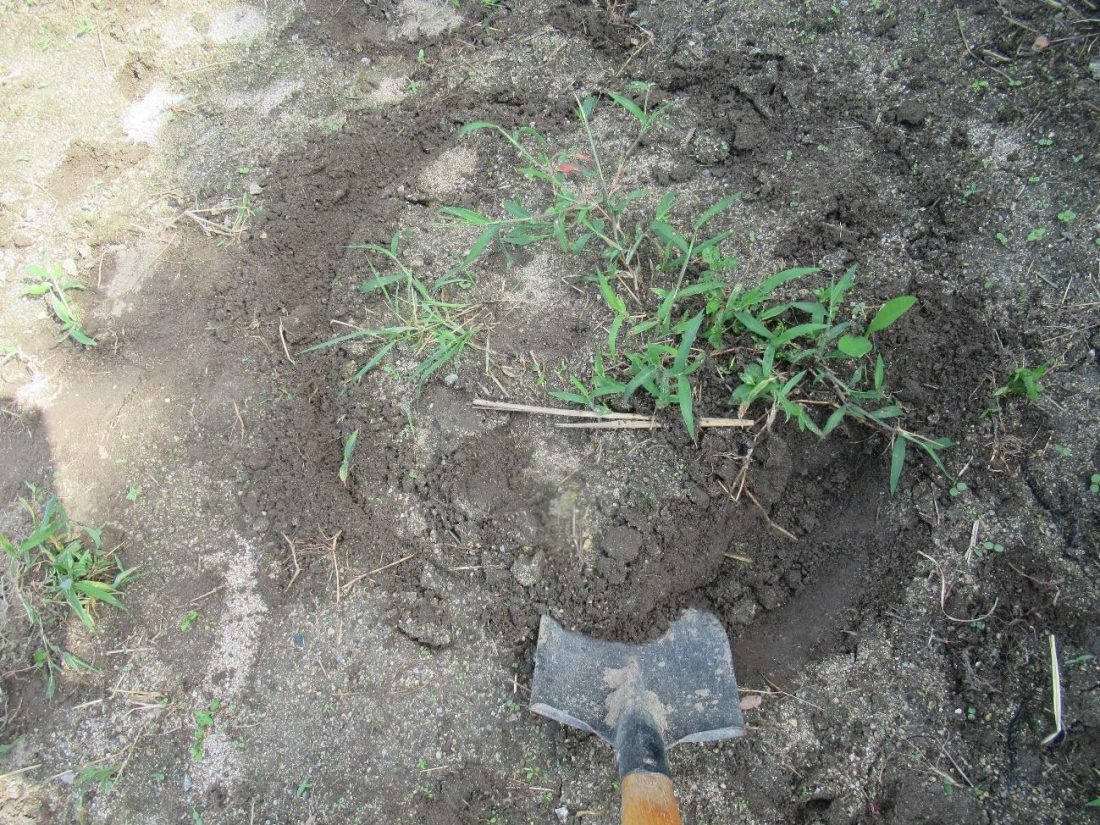
We dug the hole quite deep so that the young tree would not only fit snugly, but also have plenty of room to grow underground and not topple over. Mr. Momota put the tree in the hole and filled the cavity with dirt, making sure the tree was securely packed down by it. Unfortunately, this would be the only tree planting we’d do for today.
Next up was weed whacking, as promised the night before. I exchanged my shovel for a gardening sickle, and then we made our way down to the wall adjacent to the path I took last night to get to 88 House. The wall was densely covered with weeds, but Mr. Momota explained that there was no need to be too careful with removal of the weeds; we just had to hack until the wall was more gray than green. An insect would occasionally crawl out from inside the wall as I worked, which made the task less monotonous, and before I knew it, we had shaved the wall of its vegetative beard. The harsh sun made me sweat buckets, so at this point, we returned to 88 House for a short break and an ice-cold drink.
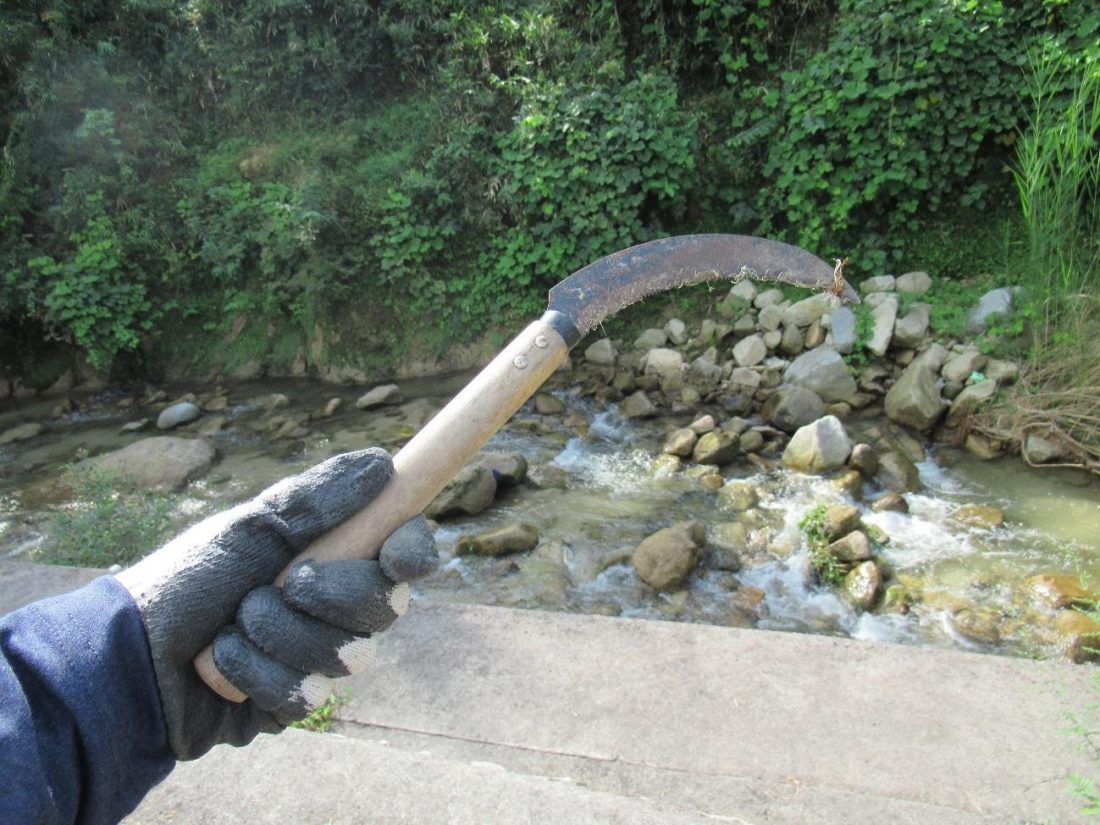
When break time was over, it was back to the weeding, but on a different terrace wall. Just like before, Mr. Momota and I started on opposite ends of the wall and met in the middle. Some of the weeds had grown so large that they had sprouted pretty flowers, but sadly, they still had to go. We cut off so much vegetation that the dirt and weeds had to be shoveled into a wheelbarrow and hauled off to be dumped into another field (hopefully to be used as compost), but pushing the wheelbarrow proved to be one of the more amusing tasks. With that complete, we called it a day.
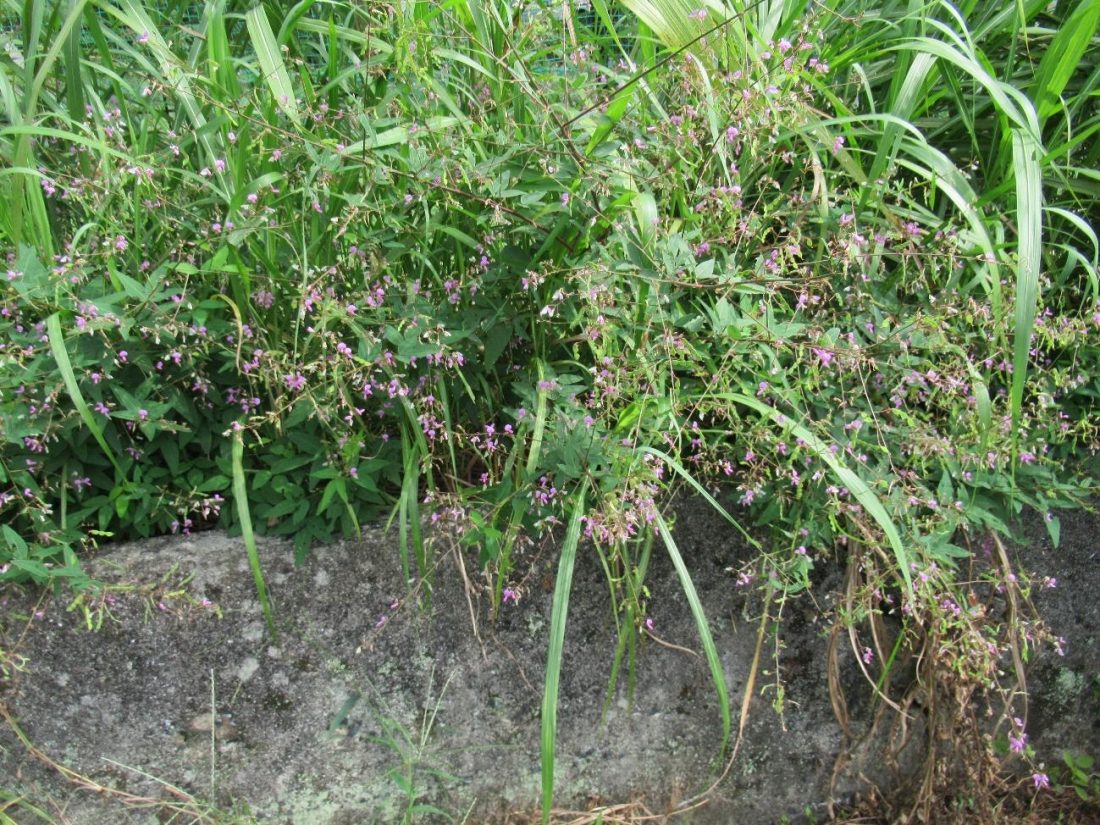
Afternoon Aftermath
I was drenched by the end of it all, so back inside the house I went to cool off, have a drink, and pack up my things for good. While we were working, Mr. Momota asked me if I had time to grab lunch with him (I did), so at this point, he went back to his own house to get ready. There’s no formal check-out time at 88 House, so guests are free to shower, put on another set of clothes, have a snack, or otherwise take it easy until they’re ready to depart. Not too long after I got my things together, Mr. Momota came to take me back into town, but not before having lunch at a local curry shop. I took one last look at the fields and still-growing crops, including this one tomato vine. The tomatoes looked yummy even now, but no doubt this plant (as well as others on the farm) would bear even more succulent fruit in due time. I hope to one day be able to visit 88 House during rice planting season or a time when some kind of fruit or vegetable is ripe for picking.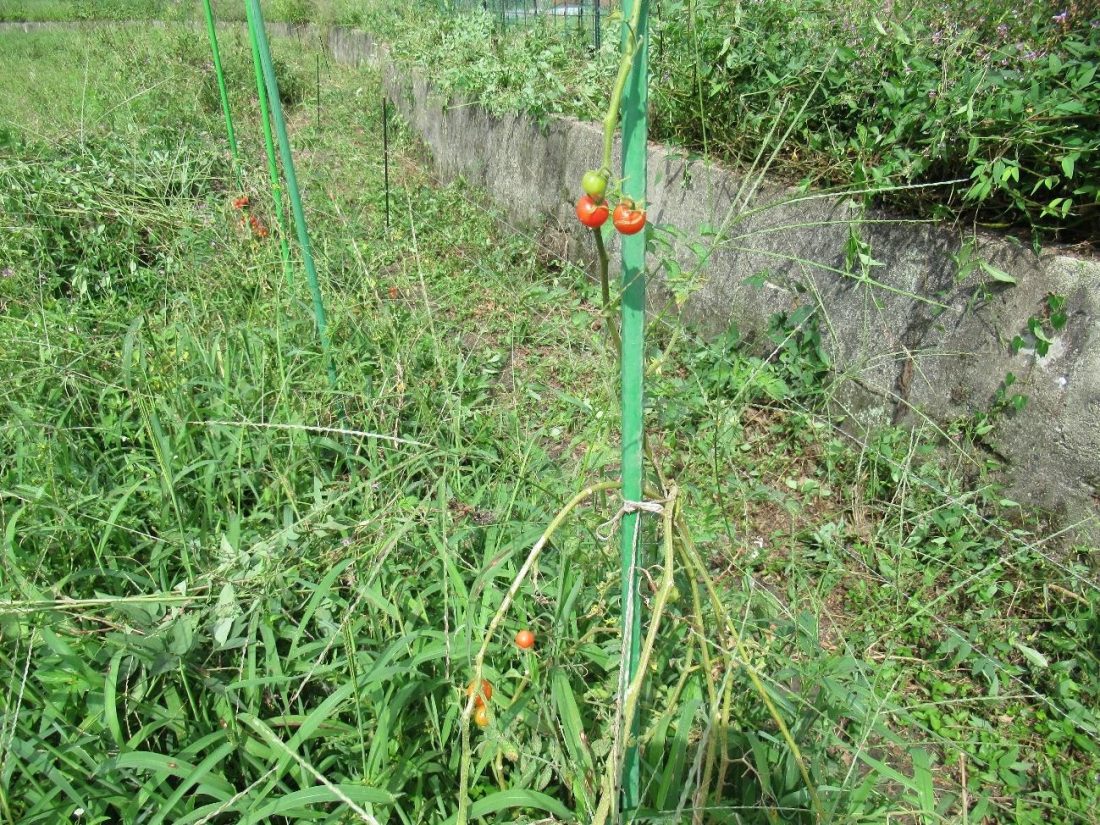
In conclusion, my stay at 88 House as well as the manageable workload the morning after were an enriching experience and a fun way to enjoy Hiroshima’s rustic side. Since it’s just a single bus ride away from Hiroshima Station, it’s an ideal stop for the night after a day of sightseeing in Hiroshima City, and what’s more, Mr. Momota may shuttle guests back to Hiroshima Station after the stay, just as he did for me. If you’re young and/or fit I highly advise you put in some work for a free stay, and since you have the chance to shower and have something to eat before leaving, continuing your adventure in Japan from Hiroshima Station becomes a cinch. Above all else, after staying at 88 House, Mr. Momota became a lifelong contact for me, and although I currently live in Hiroshima, were I ever to move to a different city, I theoretically never have to pay for lodging anytime I visit Hiroshima. With a deal like this, neither party loses money, and although neither party makes money either, in the context of human experience and intercultural dialogue, through an evening of chatter and a morning of simple labor, I’d say Mr. Momota and I both made a difference in each other’s lives.

